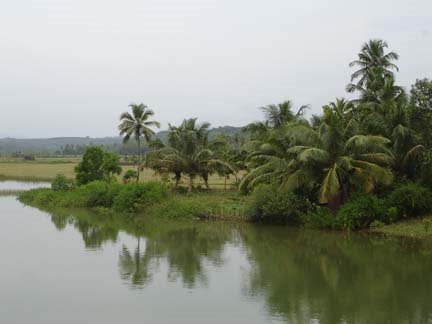The Mangalore city area north of Kodialbail (the original ‘Kudla’) around KSRTC Bus station and Bharath Mall etc is known as ‘Bijai’ area, usually pronounced like ‘bijayi’ or ‘bejayi’. The word ‘bijay’ sounds like Bengali equivalent of ‘vijay’ (= victory) to begin with.
Have you ever wondered about the origin of this place name Bijai?
Bijai
The odd sounding place name can be analysed as Bija+ayi or Beja+ayi, where in ‘ayi ‘means spatial dimension. In general we may assume that ‘bija’ stands for seed or even cashew nut. However, this sounds somewhat mysterious as the rugged topography of the area might neither had represented any agricultural or seed area; nor cashew was documented as an ancient plant in Tulunadu.
Bijadi
There are other places along the coast that carry the ethnic prefix: Bija. For example, Bijadi in coastal Kundapur Taluk, Udupi district.
Bijapur
Other analogous names include Bijapur, Bijayavada (Vijayvada), Bijaynagar (Vijaynagar), etc. While Bijapur again reminds of ‘bija’, the seed, ‘Bijayvada’ or ‘Bijaynagar’ may reminds us of the historical regal battles and victories against their less fortunate foes.
Interestingly, the Bijapur was known as 'Beja-pore' or 'Beja poor' during the British period.
Beja tribes & villages
If you look beyond the bija=seed theory, you shall find that there are numerous villages and towns around the world carrying the name of Beja (or Bija).There is a Beja vllage close to Mangalore,near Manjeshwara, Kerala. Similarly there is another ‘Beja’ village in Ludhiyana district of Punjab.There may be more such villages and hamlets, but these examples in different language zones of India may help us to visualize the regional spread of this particular ethnonym Beja.
Similarly, you shall find villages or towns named Beja (or Bija, Bejai, Bejala, Bejar, Bejak Bejan, Bejaja etc) in diverse countries of the world like Pakistan, Latvia, Laos, Brazil, Guinea Bissau, Portugal , Columbia, Spain and Tunisia. These villages were named after a nomadic pastoral tribes known as ‘Beja’, that originally lived in African zone between Red sea and River Nile , in Sudan to Egypt and migrated during the past history to diverse regions of the world.
According to Encyclopaedia Brittanica the Beja tribes are ca.4000 BC old .They speak Bejawi or Bedawi language, occupy mountain country between Red sea and River Nile.They were archers in historical armies.
These data suggest that these nomadic Beja tribes originally from Sudan Ethiopia and adjoining regions of Africa migrated during the history to different parts of the world including southern India and Tulunadu. It is also possible that these were related to the Beda tribes (Beja>Beda) of India, considering that their language ‘Bejawi’ is also known as ‘Bedawi’.
Beja is also the name of a former princely state and its capital in Himachal Pradesh in northem India.
Beja is also the name of a former princely state and its capital in Himachal Pradesh in northem India.
In Bejja village near Moodambail, Manjeshwara, Kerala, there is a Bejja guttu. The name ‘Bijja’ or ‘Bejja’ also exists as a tribal proper name among Badaga and several other south Indian tribes. Bijja and Bejja surnames still exist in India (and also other countries). ‘Bijjala’ was the name of the Kannada King during the life and times of social reformer Saint Basaveshwara (Basavanna). Similarly, Bijja Mahadevi was the name of a Lingayath nun.
Similarly, the Tulu proper name ‘Becha’ (as in ‘Bechanna’) of yester years appears as a fossil variant of the tribal name Beja. In Orissa, we find proper names like 'Biju' (for example,Biju Patnaik).
In view of these, the Bijai place name of Mangalore or Bijadi of Kundapur or even Bijapur or Vijayavada , like other hosts of 'Beja' village names, may actually represent ancient colonies of Beja tribes in southern India. The ancient Beja tribes that left their signature ethnic names as fossil imprints in our place names, now totally forgotten in our cultures and regions, have obviously been seamlessly assimilated during the history into various Tulu Kannada and other Indian communities.
*
Bejjara = Vajra
A curious endpiece worth pondering over:
H. Vishwanath has pointed out the relevant word ‘Bejjara’. Incidentally, ‘Bajjara’, the Pali /Prakrit word, has been considered as ‘tadbava’ (derivative) of the Sanskrit word ‘Vajra’ (=diamond).
Africa, the original home of Bejja tribes, is also well known for large diamond deposits and mines. One possibility is that the diamond was introduced in India in the antiquity by the Bejja immigrants from Africa. And hence the word ‘ bejj+ara’ ( stone brought by Bejja) might have been coined in the ancient Indian languages like Prakrit or their precursor languages.
In that case, the refined word ‘Vajra’ appears to have been derived from the earlier coined word ‘bajjara’ or ‘bejra’.
H Vishwanath provides some more interesting additions to the meaning and scope of word 'Bejja':
'Bejja' (Sanskrit Vejja) means 'hole'. Bejja localities apparently were in a hole-like or narrow strip of land in between two hills.
Bejjawada (Sanskritised Vijayawada) possibly got its name because of the narrow passage of Krishna river between two hills, forming a bejja, that is is a deep hole-like passage (Ref: Bharatiya Sthalanama Patrike Vol.8, Page 43). 'Potare' in Kannada means a bejja/vejja in a tree.
The other meaning of Bejja is Baidya/Vaidya (Doctor). Baidya was a sect dealing with herbal medicine among the Bhils (>Billava) or Beda tribes. It appears that these tribes were responsible for the introduction and evolution of herbal medicines and Ayurveda in India. The renowned Tulu heroes Koti and Chennaya were born to a lady called ' Devi Baideti' who was proficient in administering herbal medicines.
In Bengali also bejja means a doctor.
®



hi... nanna tulu ashtu volledilla... kannada baruthade :-) nenage Indiblooger alli nodidhu... naansa wondu Mangalore blogger...:-)
ReplyDeletenaanu ondu contest nalli paticipate maaduthene... please nanage vote maadi neevu...
http://www.indiblogger.in/indipost.php?post=30610
thumba help aaguthadhe... dhanyavaadagalu :-)